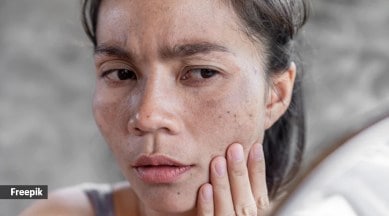📣 For more lifestyle news, click here to join our WhatsApp Channel and also follow us on Instagram
Things you must (and not) do to manage hyperpigmentation
“The biggest risk factors for general hyperpigmentation are sun exposure and inflammation," said Dr Ajay Rana, a dermatologist

Hyperpigmentation is a skin condition that causes small or large patches of the skin to appear darker than others; this can happen anywhere on the body. A result of excess melanin production, the biggest risk factors for general hyperpigmentation are sun exposure and inflammation, both of which can lead to an increase in melanin production, said Dr Ajay Rana, a dermatologist, adding that often, trauma to the skin can also cause hyperpigmented patches.
Adding, the expert told indianexpress.com that darker skin types are more prone to pigmentation changes. “Melanin, produced by skin cells called melanocytes, is the pigment that gives skin its colour. Certain medications, hormonal changes, and sun exposure can affect melanin production,” he shared.
So, how can one manage the same?
Dr Rashmi Shetty, a dermatologist, listed some dos and don’ts to follow while treating the skin concern on Instagram.
Make sure your skin is well-hydrated from inside out
*Apply a moisturiser based on your skin type, every single day and night.
*Incorporate hydrating foods, as well as those that give you fatty acids in your diet.
*Consume supplements that will help hydrate your skin from within.
Never skip SPF
Dr Shetty stressed that exposure to sun can not only cause pigmentation but also worsen it, therefore, using sunscreen throughout the day is non-negotiable. “Make sure you reapply your sunscreen every four hours, especially if you are prone to pigmentation or already have it,” she recommended, adding that sunscreen is a must irrespective of the weather, and also if you are indoors (considering exposure through windows and blue light from electronic devices.)
Go to an expert
The dermatologist strictly advised against self-medicating or attempting to treat hyperpigmentation at home. “Google may be a good way to become more aware of what’s out there, but you must leave some things to qualified experts,” she wrote, further stating that self-treating can lead to worsening of pigmentation. Further one can get peels, lasers, and facials to treat pigmentation at their doctor’s clinic.
Ingredients that help with pigmentation
Dr Rana suggested using topical prescription medication that contains hydroquinone, which lightens the skin. “However, it is best to use the medication under the care of a dermatologist so that they can guide you properly. One can also use topical retinoids to assist with lightening of dark spots on the skin,” he shared.
Dr Shetty mentioned other ingredients that reduce pigmentation, suggesting them to be used night “while you focus on protecting and hydrating your skin during the day”.
*Niacinamide
*Vitamin C
*Kojic Acid
*Azelaic Acid
*Liquorice
*Berry extracts
*AHAs
*Arbutin
“However, you can apply niacinamide and arbutin during the day,” she added.
📣 For more lifestyle news, follow us on Instagram | Twitter | Facebook and don’t miss out on the latest updates!
📣 For more lifestyle news, click here to join our WhatsApp Channel and also follow us on Instagram